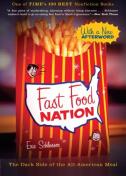BKMT READING GUIDES
Fast Food Nation: The Dark Side of the All-American Meal
by Eric Schlosser
Paperback : 384 pages
3 clubs reading this now
0 members have read this book
New York Times Bestseller,
With a New Afterword
“Schlosser has a flair for dazzling scene-setting and an arsenal of startling facts . . . Fast Food Nation points the way but, to resurrect an old fast food slogan, the choice is yours.”—Los Angeles Times
In 2001, Fast Food Nation ...
Introduction
New York Times Bestseller,
With a New Afterword
“Schlosser has a flair for dazzling scene-setting and an arsenal of startling facts . . . Fast Food Nation points the way but, to resurrect an old fast food slogan, the choice is yours.”—Los Angeles Times
In 2001, Fast Food Nation was published to critical acclaim and became an international bestseller. Eric Schlosser’s exposé revealed how the fast food industry has altered the landscape of America, widened the gap between rich and poor, fueled an epidemic of obesity, and transformed food production throughout the world. The book changed the way millions of people think about what they eat and helped to launch today’s food movement.
In a new afterword for this edition, Schlosser discusses the growing interest in local and organic food, the continued exploitation of poor workers by the food industry, and the need to ensure that every American has access to good, healthy, affordable food. Fast Food Nation is as relevant today as it was a decade ago. The book inspires readers to look beneath the surface of our food system, consider its impact on society and, most of all, think for themselves.
“As disturbing as it is irresistible . . . Exhaustively researched, frighteningly convincing . . . channeling the spirits of Upton Sinclair and Rachel Carson.”—San Francisco Chronicle
“Schlosser shows how the fast food industry conquered both appetite and landscape.”—The New Yorker
Eric Schlosser is a contributing editor for the Atlantic and the author of Fast Food Nation, Reefer Madness, and Chew on This (with Charles Wilson).
Editorial Review
On any given day, one out of four Americans opts for a quick and cheap meal at a fast-food restaurant, without giving either its speed or its thriftiness a second thought. Fast food is so ubiquitous that it now seems as American, and harmless, as apple pie. But the industry's drive for consolidation, homogenization, and speed has radically transformed America's diet, landscape, economy, and workforce, often in insidiously destructive ways. Eric Schlosser, an award-winning journalist, opens his ambitious and ultimately devastating exposé with an introduction to the iconoclasts and high school dropouts, such as Harlan Sanders and the McDonald brothers, who first applied the principles of a factory assembly line to a commercial kitchen. Quickly, however, he moves behind the counter with the overworked and underpaid teenage workers, onto the factory farms where the potatoes and beef are grown, and into the slaughterhouses run by giant meatpacking corporations. Schlosser wants you to know why those French fries taste so good (with a visit to the world's largest flavor company) and "what really lurks between those sesame-seed buns." Eater beware: forget your concerns about cholesterol, there is--literally--feces in your meat.Schlosser's investigation reaches its frightening peak in the meatpacking plants as he reveals the almost complete lack of federal oversight of a seemingly lawless industry. His searing portrayal of the industry is disturbingly similar to Upton Sinclair's The Jungle, written in 1906: nightmare working conditions, union busting, and unsanitary practices that introduce E. coli and other pathogens into restaurants, public schools, and homes. Almost as disturbing is his description of how the industry "both feeds and feeds off the young," insinuating itself into all aspects of children's lives, even the pages of their school books, while leaving them prone to obesity and disease. Fortunately, Schlosser offers some eminently practical remedies. "Eating in the United States should no longer be a form of high-risk behavior," he writes. Where to begin? Ask yourself, is the true cost of having it "your way" really worth it? --Lesley Reed
Discussion Questions
No discussion questions at this time.Book Club Recommendations
Recommended to book clubs by 0 of 0 members.
Book Club HQ to over 88,000+ book clubs and ready to welcome yours.
Get free weekly updates on top club picks, book giveaways, author events and more








